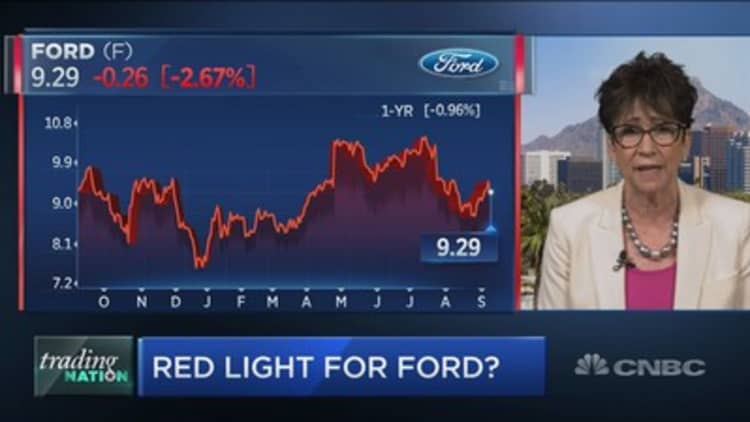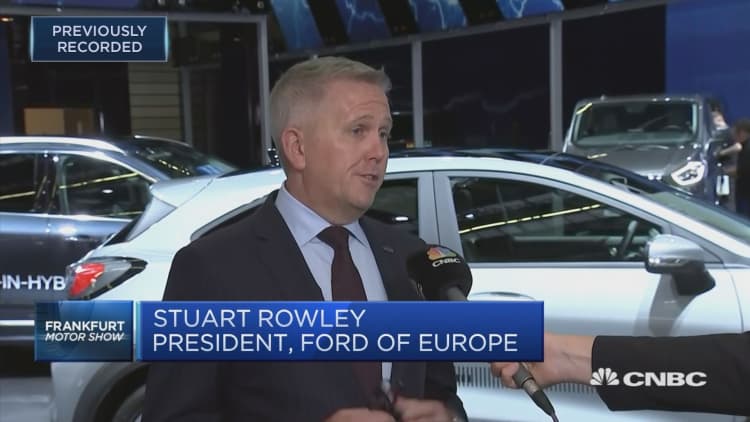Santa Monica, Calif., start-up company Fair has agreed to acquire Ford's monthly vehicle subscription service, Canvas, for an undisclosed amount, the companies said Thursday.
The purchase marks healthy growth for Fair, but another retreat from an emerging mobility business for Ford as it cuts costs under an $11 billion restructuring plan through 2022.
Ford's shares were relatively unchanged after in midday trading Thursday at just under $10 a share.
Vehicle subscription services are marketed as an alternative to owning a car. For under $200 a month for a 2017 Nissan Versa, subscribers get the car, insurance and maintenance without having to lock into a long-term lease. The appeal is in the simplicity of rolling all of those costs into one monthly payment. Luxury cars, of course, cost more. A 2018 Lexus LX 570 SUV starts at $1,175 a month, according to the company's website.

Fair gained notoriety for attracting investments from high-profile companies such as SoftBank and partnering with Uber to provide vehicles for their drivers starting at $130 a week.
Scott Painter, CEO and founder of Fair, said the acquisition will nearly double the company's engineering capabilities and provide rapid expansion for operation in San Francisco and its overall customer base.
"We just became a much bigger, more dominant platform," Painter, an automotive retail veteran and former founder and CEO of TrueCar, told CNBC. "This is really a reflection of the scale of where we're operating."
Canvas CEO Ned Ryan called the sale "a natural fit" for both companies.
Ford acquired San Francisco-based Canvas, then known as Breeze, through its consumer financing arm Ford Credit in September 2016. It began operating as Canvas in May 2017, offering variable-term leases with flexible payment options to San Francisco-area residents before expanding to Los Angeles.
Sam Smith, executive vice president of strategy and future products at Ford Credit, said the company "learned a lot about subscription services, fleet management and the technology" from Canvas.
Fair will acquire all of Canvas' assets, including nearly 100 employees. About 20% or less of Canvas' staff was let go or decided not to join Fair ahead of the announcement, according to Painter. Canvas' thousands of subscribers will have the opportunity to join Fair at the end of their current vehicle subscription.
Canvas is the second notable mobility unit Ford has shed this year. In March, it ended operations of Chariot, a shuttle-based ride-sharing service. The company reportedly paid roughly $65 million to acquire the San Francisco-based startup in September 2016.
Ford expanded Chariot from San Francisco to seven cities before ending operations in March – seven months after Streetsblog NYC reported the service was "a big, expensive failure."
Going public?
Since launching in August 2017, Fair reports it had more than 45,000 users in more than 30 U.S. markets in about 20 states. Users, using the Fair app, can subscribe to the subscription program and switch vehicles through the term of their "lease."
Fair, according to Painter, is just "starting really to hit a scaling moment," as it is growing at a pace of 200-400 subscribers per day. He said the privately-held company plans to go public "sooner rather than later."
"We're not building the company with the focus of taking it public but there's just simply too many dollars involved not to be a public company sooner rather than later and we're definitely building with that in mind," he said.
Fair, he said, is not under "immediate pressure" to go public but the public sector is better suited for the company as it continues to grow over the long-term. Fair, in the coming years, plans to grow nationally as well as internationally, according to Painter.
"We view all of the innovation that's going on as a really strong signal that mobility is changing and we that need to be out and constantly innovating to keep up with it," he said.
Challenging business
Subscription services have been money-losers for many companies and face potential legal issues over state dealership franchise laws regarding the use of new vehicles.
Cadillac, Volvo and Porsche were among the first automakers to launch vehicle subscription services. Each has had to modify their businesses, including Cadillac suspending all operations amid the service hemorrhaging cash.
Painter declined to provide guidance as to when Fair is expected to be profitable, however he said the underlying economics of the business are healthy.
"It is not an inherently unprofitable business," he said. "We are growing very fast, so we are going to continue to invest in our business for some time but at its core, the unit economic of this business are very positive. We already have cohorts in our business that are profitable.
"I think that's an important distinction between Fair and a lot of companies that are just sort of investing blindly in customer acquisition costs and growth."
WATCH: Ford Europe president says every future Ford car in Europe will be electrified



